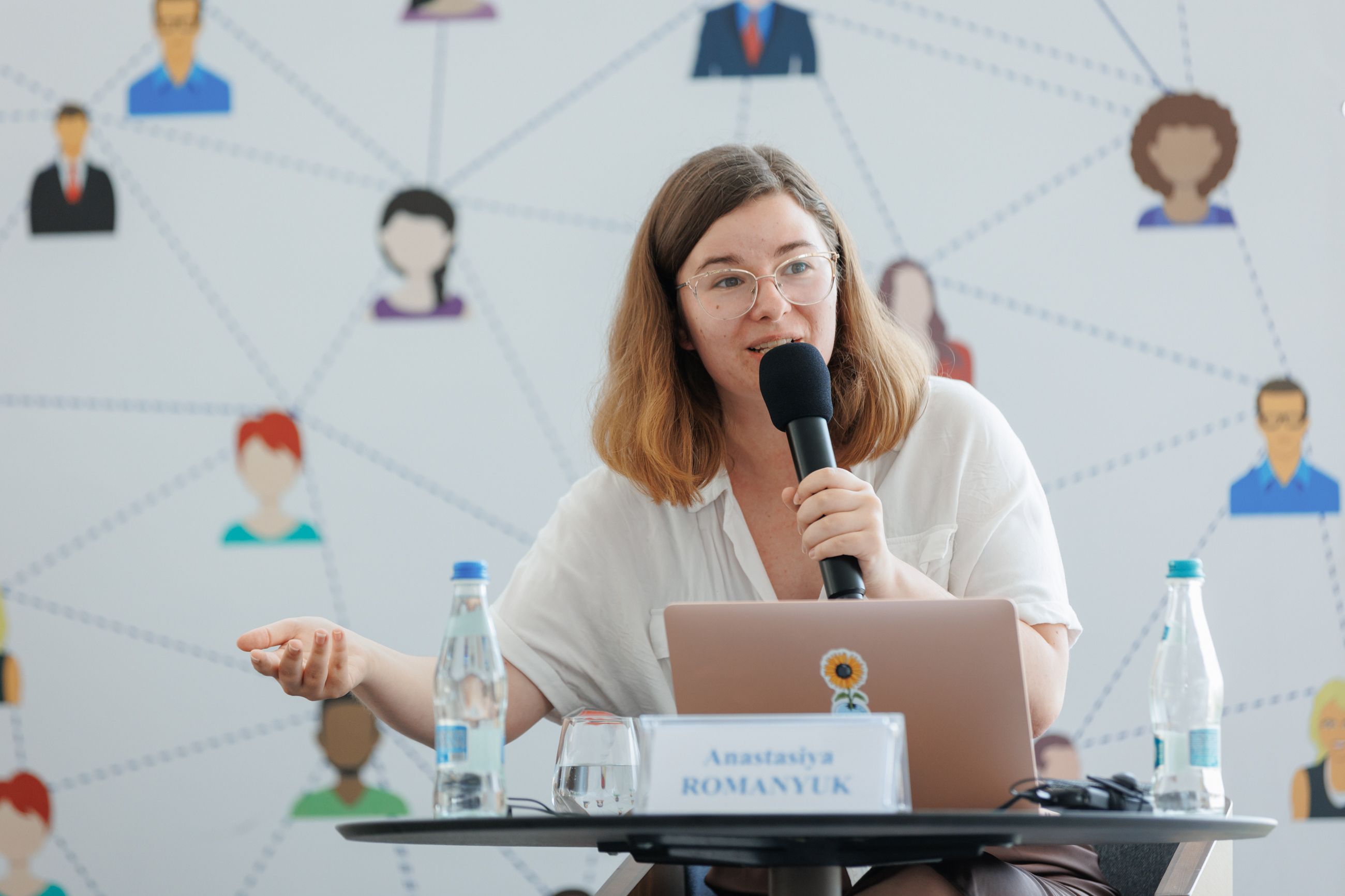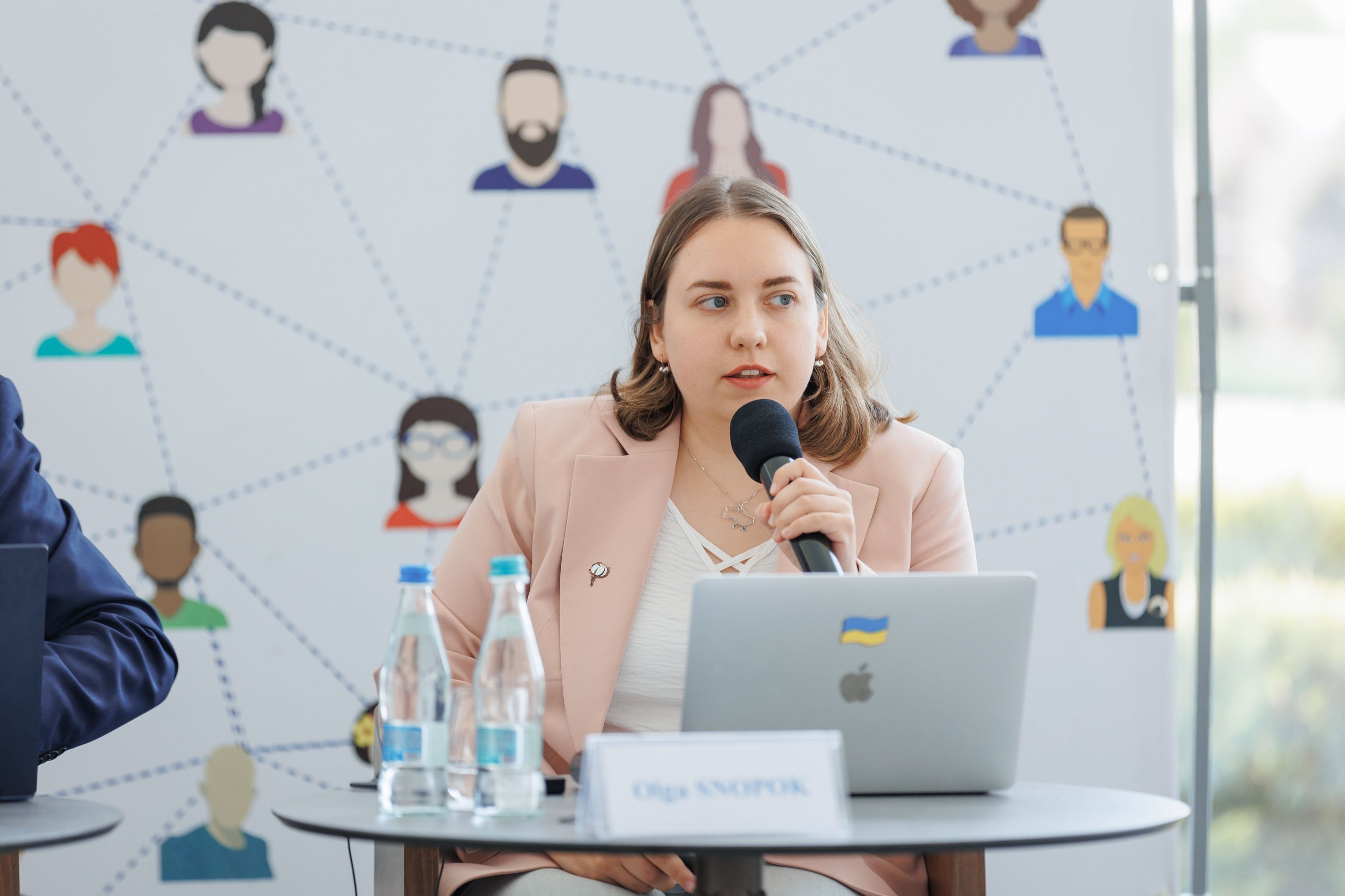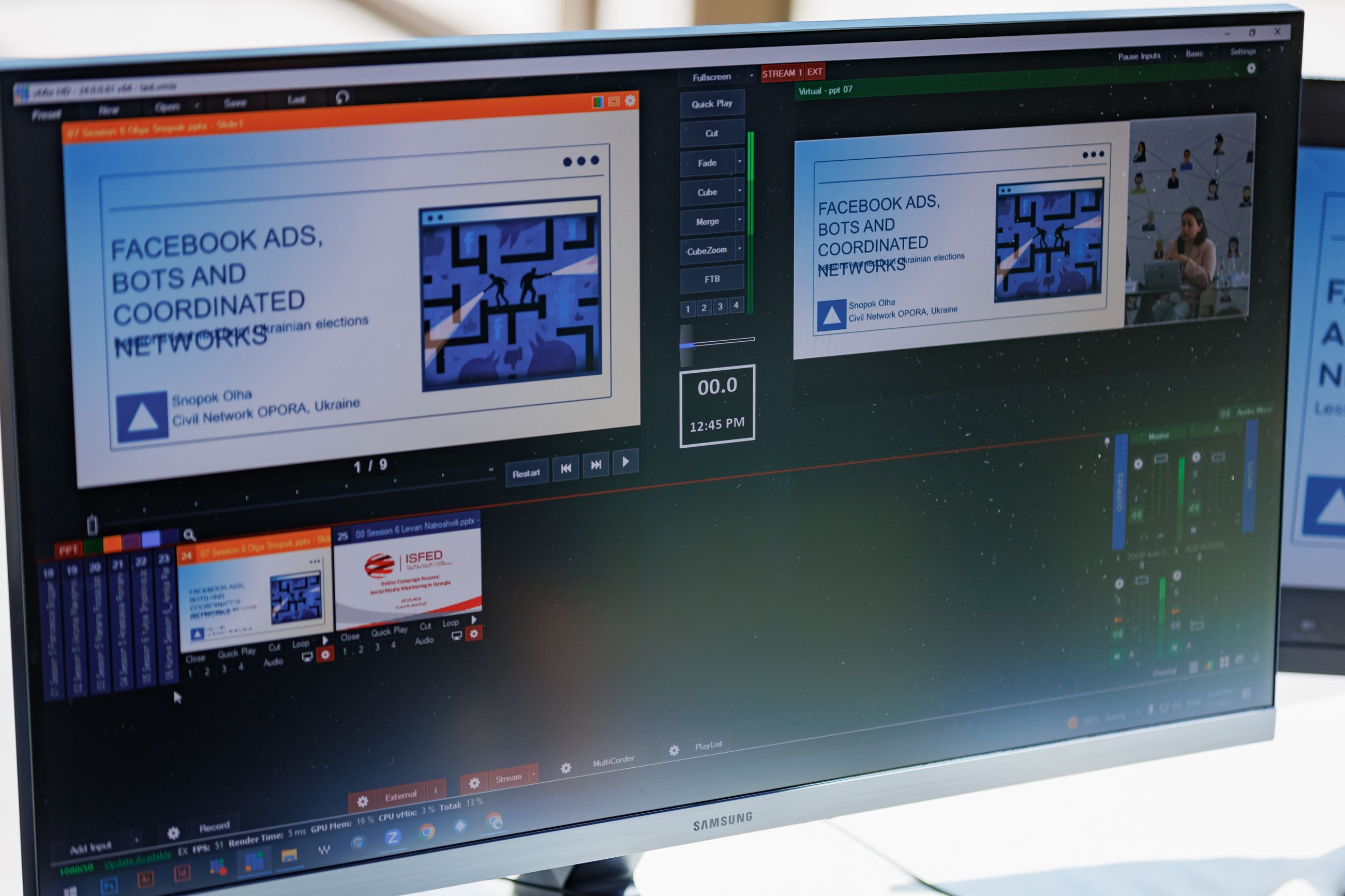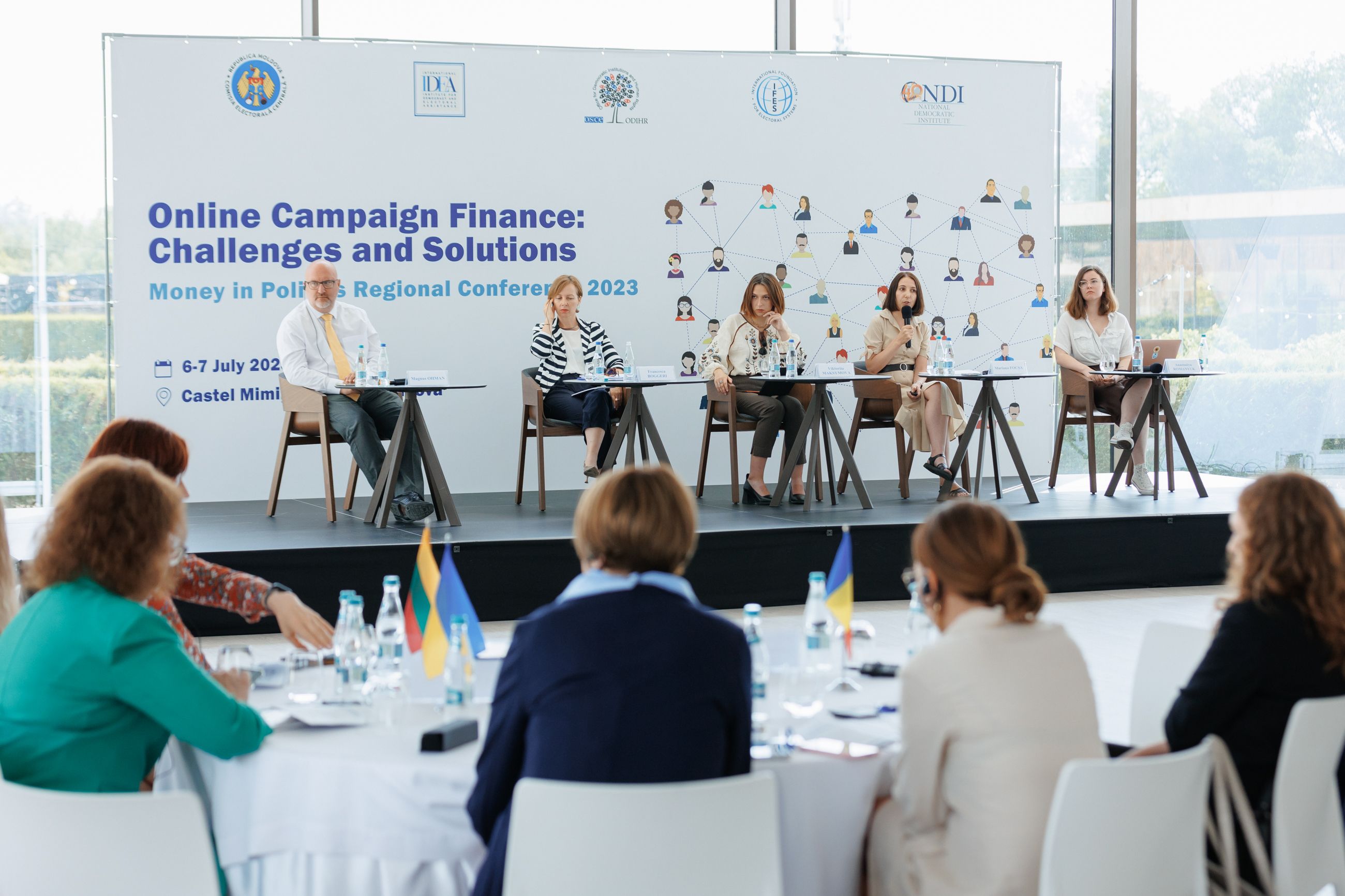The role of digital technologies in politics keeps growing. As a result, the risk of misusing them for political campaigning is augmenting, too. It offers new opportunities and challenges for electoral actors. The issues of political finance in Ukraine, Moldova, Georgia, and Armenia were discussed during the two-day regional conference “Money in Politics 2023. Online Campaign Finance: Challenges and Solutions” taking place in Moldova, on July 6-7.
The event brought together the representatives of oversight bodies over political finances, NGOs and international organizations, political parties, and shared access online platforms.
The discussion was also joined by OPORA analysts, Anastasiia Romaniuk (discussion panel on the “Role of Observers in Efficient Monitoring of Financing Political Online Campaigns”) and Olha Snopok (discussion panel on the “New Challenges in Online Campaigns: Influencers, “Troll” and “Bot” Farms, Funding Third Parties and Foreign Funding”).
Weak regulation of political finances is not a new problem. However, the monitoring and identification of infringements, as well as the application of sanctions against abuse has aggravated with the onset of online campaigning. The observation bodies over political finance and representatives of civil society all over the world face such challenges trying to ensure the conformity of online campaigns with democratic standards that guarantee quality of participants, principles of free and fair vote, and the transparency and accountability of money in politics.
Due to fast growth of Internet and easy access, social media became the most accessible instrument of pre-election campaigning. In addition to direct political ads on these platforms, politicians also engage influencers. They are opinion leaders who have the charisma and reputation and can be used to share political ads on their behalf in exchange of financial reimbursement. Some politicians use the so-called “troll farms” and “bot farms,” the organized financial groups sharing partial and/or untruthful information and opinions.

“We started the monitoring of political campaigning right after the Meta’s Political Ads Library became available in Ukraine,” revealed Anastasiia Romaniuk. “The monitoring of early campaigning helps identify future “red flags” that must not be ignored during the campaign. For example, that is how we detected 10 Ukrainian political parties who spent from 10 to 50 thousand dollars for early campaigning on Facebook.”
OPORA representative also added that the organization is tracking only the expenses lodged from official candidates and parties that they declared themselves: “If we included all the pages into monitoring, the numbers would be higher. However, the network between the official pages and the pages led by supporters is rather blurred.”
Anastasiia Romaniuk emphasized that OPORA, as a non-governmental organization, believes their key power is in increasing the accountability of candidates through public observation and the collection of various and broadest possible database of cases. It helps build the fullest possible understanding of the scale of online campaigning and identify spheres where the cooperation with state regulators will be most productive.
“The role of Meta as the only tech company providing a proper level of transparency has become even more relevant during the full-scale invasion which has crucially changed the Ukrainian mediascape. It is especially pertinent in the context of the growing popularity of the Telegram which is not monitoring its content and boasting of its unwillingness to cooperate with state authorities,” — Anastasiia Romaniuk emphasized.

“In 2019, social media first out-competed all other information sources in Ukraine. They became a powerful platform for campaigning used by Ukrainian politicians and parties at the presidential, parliamentary, and local elections in 2019 and in 2020. During those election campaigns, OPORA detected an intense use of political ads on Facebook, and also identified the non-authentic accounts (trolls and bots) and the coordinated networks. The coordinated non-authentic behaviour and foreign influence are major challenges for Ukraine in the context of pre-election campaigning of the several past years,” said Olha Snopok.
The scale of abuse with online campaign tools in Ukraine can be illustrated with the following numbers: according to the data from the Meta company, in 2017–2020, Ukraine was the fifth major place in the number of coordinated networks of pages on Facebook and Instagram.
“From September 2019 to December 2021, over 1000 accounts in Ukraine were blocked, and also almost 900 Facebook pages and groups created inside Ukraine had a close link to Ukrainian political figures, and tried to influence public opinions. It is equally important to mention that during the recent presidential, parliamentary, and local elections, Facebook found and blocked in Ukraine at least 6 major networks of pages and accounts administered from Russia that tried to influence the internal Ukrainian agenda,” Olha Snopok emphasized. “it is impossible to establish a punishment in the law for the use of network of pages and non-authentic accounts, and it poses multiple challenges for civil society activists. In this case, one must rely exclusively on the willingness and capacity of tech companies, such as META, to delete such content.”
The analysts also revealed that during the recent election campaign before the 2020 local elections, OPORA alone identified three coordinated networks of pages used by candidates and parties for their promotion: “The networks included the total of 65 Facebook pages, and we also managed to identify under the posts at least 154 non-authentic accounts that promoted parties or candidates.”
The largest network identified by OPORA included 19 pages: “All of them worked to support the city mayor of a Ukrainian city, and discredited his main opponent. We managed to identify at least 55 bot accounts on the pages of this network. It is also essential to know that most pages in this network belong to municipal media, i.e. the ones functioning at the local budget cost. Since the campaign was run by a local mayor it is a case of abusing administrative resources. However, since Facebook campaigning is beyond the legal regulation, the only thing we can do as civil activists is to publish our research and try to impact the politician’s public reputation.”
“Unfortunately, the use of bots and networks of pages for campaigning during elections is not prohibited,” Olha Snopok explained. “For us, it is a major issue: although we do have the resources to identify such campaigns, it is much harder to bring this message through to tech companies or officials. Nonetheless, we have success stories, too. Those are cases when tech companies cooperate with us in the fight for the fair election process. One such case is related to Andriy Palchevskyi, who was running for Kyiv mayoral elections in 2020.”

OPORA representatives emphasized that civil society sector in Ukraine faces multiple challenges that complicate the combat of non-authentic behaviours. In the first place, there is no direct and fast contact with the social media owners who would be able to rapidly respond to the detected infringements. Another critical issue is that there is no option to work with other social media, such as YouTube, since this platform’s Ad Library is only available for a small selection of countries. YouTube is critical for campaigning in Ukraine but it is hardly possible to work with this platform in a manual mode. Problem No 3 comes from the messengers, especially from Telegram. According to OPORA’s recent sociological survey, Telegram is used by almost 78% of Ukrainians. It will certainly become a key campaigning platform during the next elections.
Video recording of the panel session (in English and Ukrainian):
